The Wolves of Midwinter twgc-2 Read online
Page 34
“And it is all right with you what’s happened,” asked Reuben. “That they used the Chrism to save your life, and that you’re now one of us.”
“Didn’t I just say that it was?” asked Phil.
“Can I be blamed for asking a question like that twice?” asked Reuben.
“No, of course not,” said Phil gently. He sat back and looked at Reuben with the saddest smile. “You are so young, and so naïve and so truly good of heart,” he said.
“Am I? I always wanted you with us!” Reuben whispered.
“I knew what I was doing when I came here,” said Phil.
“How could you have really known?”
“It wasn’t the mystery that drew me,” Phil explained. “It wasn’t mad speculation as to whether these friends of yours really had the secret of living forever. Oh, I knew there was a possibility of that, yes. I’d been putting it together for some time, just as your mother had. It wasn’t only the picture in the library, or the unusual personalities of the men who were living with you. It wasn’t just their curious anachronistic speech, or the odd points of view they hold. Hell, you’ve always had a way of speaking that made us joke about your being a little changeling.” He shook his head. “So it wasn’t all that surprising that you’d cultivate some group of otherworldly friends who sounded as strange as you sometimes sound. No, it’s overwhelming and irresistible, surely, immortality. It is. But I don’t know that I quite believed that part of it all. I don’t know that I believe it now. It’s easier to believe that a human being can turn into a beast than it is to believe he’ll live forever.”
“I understand that perfectly,” said Reuben. “I feel exactly that way, myself.”
“No, it was something more mundane than that yet infinitely more profound and meaningful that brought me here. I was coming to live with you in this anointed place, because I had to do it! I just had to. I had to seek this refuge against the world to which I’d given my long and dreary and inconsequential life.”
“Dad—.”
“No, son. Don’t argue with me. I know who I am. And I knew I had to come. I had to be here. I had to spend my remaining days somewhere that I truly wanted to be, doing the things that mattered to me, no matter how trivial. Walking the woods, reading my books, writing my poems, looking out at that ocean, that endless ocean. I had to. I couldn’t keep moving towards the grave step by step—choked with regret, choked with bitterness and disappointment!” He sucked in his breath as though he were in pain. His eyes were fixed on the barely visible line of the horizon.
“I understand, Dad,” said Reuben quietly. “In my own way, my young and naïve way, I felt the same thing the first day I came here. I can’t say I was on a dreary path to the grave. I just knew I’d never lived, that I’d been avoiding living—like I’d learned early to decide against life rather than for it.”
“Ah, that’s beautiful,” Phil said. His smile brightened again as he looked at Reuben.
“Dad, do you understand the things that Hockan said? Did you follow the thread?”
“Most of it,” said Phil. “It was a bit like a dream. I was lying right on the earth and the earth was cold, but I was warm under those coverings. And I was listening to him. I knew he was aiming his powerful arrows at Felix and at you and Stuart. I heard him. I put it all together. And in the nights since I’ve been going over and over it, with Lisa’s little whispers here and there, patching it together.”
Reuben screwed up his courage, and then he asked, “Do you think there was truth in what Hockan said? Do you think he was right?”
“What do you think, Reuben?” asked Phil.
“I don’t know,” said Reuben, but the words were lame. “Each time I talk about it with myself, each time I see Felix or Margon or Sergei—I come to realize a little more that I have to make up my mind, my own mind, as to what I feel about the things Hockan said to us.”
“I understand that. I respect that.”
Reuben reached inside his jacket and withdrew a folded piece of paper, and then he handed that to Phil.
“That’s everything he said to us, written down there,” Reuben explained. “That’s every word. Exactly as I recall it.”
“My son, the honor student,” said Phil. He unfolded the page, and read the words slowly, thoughtfully, and then closed up the page again.
He looked expectantly at Reuben.
“It’s had a devastating effect on Felix,” said Reuben. “He’s deeply discouraged.”
“That’s understandable,” said Phil. He had more to say, but Reuben continued.
“Margon does not seem moved, one way or the other,” he said, “and Sergei and Stuart seem absolutely to have forgotten all of it, to have swept it aside like it never happened. They certainly aren’t afraid of Elthram and the Forest Gentry. They seem as comfortable with them as they ever were.”
“And Laura?”
“Laura has asked the obvious question: ‘Who is Hockan? Is Hockan an oracle? Or is Hockan a fallible creature like the rest of us?’ ”
“So the ones who’ve been really hurt by this are you and Felix?”
“I don’t know, Dad. I can’t get his words out of my head! I’ve never been able to get the negative voices of my life out of my head. I’ve struggled all my life to find my own truth and I find myself smothered by other people’s words. It’s as though they’re always shouting at me, bullying me, shaking their fists, and half the time I can’t find what I think.”
“Don’t sell yourself short, son,” said Phil. “I think you do know what you think.”
“Dad, know this,” said Reuben. “I love that house, this place, this part of the world’s great forest. I want to bring my son here. I want to be here with you. I love them all, my new family. I love them more than I can say. Laura, Felix, Margon, Stuart, Thibault, Sergei, all of them. I love Lisa, whoever and whatever she is. I love the Forest Gentry.”
“I hear you, son,” said Phil, smiling. “I’m extremely fond of Lisa, too.” He gave a short secretive laugh. “ ‘Whoever and whatever’ she might be.”
“The thought of leaving Nideck Point behind, of breaking off all contact with my mom, of giving my son over to Mom to bring up, of never seeing Jim again—these are things I can hardly bear to think about. My heart’s breaking.”
Phil only nodded.
“I feel larger and stronger here than I’ve ever felt anywhere,” said Reuben. “That day at the village fair and the banquet here, I sensed a creative energy all around me. I felt a creative spirit that was infectious. I don’t know any other words to describe it. I felt it was good, all that Felix had done, all that Felix had brought into being. It was like magic, Dad. Over and over he made something out of nothing. A bleak winter, a dying town, a great empty house, a day that might have been like a thousand other days. He transformed all this. And it was good. I swear it was. Yet here comes Hockan’s judgment, Hockan’s dark reading of the script to make some other story out of it.”
“Yes, Reuben, that’s just what Hockan did,” said Phil.
“Hockan calls this great house a snare, an abomination.”
“Yes, son, I heard him.”
“What is Felix’s sin, Dad? That he wants to live in fellowship with all living creatures—with spirits, ghosts, Morphenkinder, with Ageless Ones like Lisa, with human beings? Is that really evil? Is that the Original Sin here that killed Marchent?”
“What do you think, Reuben? Is it?”
“Dad, I have no idea what immortality is. I’ve admitted that before. I just don’t know. But I do know I’m struggling here for the finer feeling, for the finer understanding. Whatever I am, I have a soul. I’ve known that always. And I can’t believe that Marchent’s out there lost and suffering because of the dreadful secret of what we are, because of the sins of Felix in loving her and her parents and keeping our secrets from them. Felix would never have left Marchent if those evil men hadn’t taken him prisoner.”
“I know, son. I know the story. H
ockan provided all the missing pieces of the puzzle to me as I was lying there in that clearing.”
“And I can’t lay the blame on Felix that the Forest Gentry astonished everyone. They did something that no one knew they could do. That’s obvious. But was that Felix’s doing because he called them and invited them here?”
“No. I don’t think it was,” said Phil. “The Forest Gentry have always had their own reservoir of power.”
“If only I could talk to Marchent!” said Reuben. “If only I could hear her voice. I’ve seen her, seen her tears, seen her misery. Hell. I’ve even made love to her, Dad, held her in my arms. But no voice comes from her. No truth comes from her.”
“And what could she tell you, Reuben?” Phil asked. “She’s a ghost, not a deity or an angel. She’s a lost soul. Beware of what she might say, just as you should beware of Hockan.”
Reuben sighed. “I know that. I know that. I keep wanting to ask Elthram. Surely he knows why she haunts. He must know.”
“Elthram knows what Elthram knows,” said Phil. “Not what Marchent knows, if she knows anything.”
They were quiet. Phil drank another mug of coffee. And outside the rain picked up, shimmering and singing on the windows. Such an intimate sound, the rain gusting on the panes. The colorless sky unaccountably brightened in spite of the rain, and far out to sea a ship moved on the distant horizon. It was barely visible in the gray dazzle of the sea.
“You won’t tell me what to do, will you?” asked Reuben.
“You don’t want me to tell you what to do,” said Phil. “You need to discover that for yourself. But I will tell you this. You’ve taken my mind off my rapidly fading aches and pains; you’ve done me wonders. And whatever happens, whatever you decide, whatever Felix decides, nobody will separate you from me or me from you and Laura.”
“That’s true. That is absolutely true.” He looked at his father. “You’re happy, aren’t you, Dad?”
“Yes,” Phil answered.
24
IT WAS THEIR FIRST DINNER together since Modranicht. They sat around the dining room table, eagerly feasting on the baked fish, roast chicken, and sliced pork with platters of hot steaming buttered greens and carrots. Lisa had baked fresh bread, and apple pies for dessert. And the chilled Riesling was sparkling in the crystal decanters and glasses.
Reuben was in his usual place, to the right of Margon, and Laura sat beside Reuben. Then came Berenice and Frank, and Sergei, while opposite sat Felix as always with Thibault on his left and Stuart next with Phil beside him.
It was easy and quiet as if they’d dined this way a hundred times before, and when the conversation erupted, it was of ordinary things, like the little New Year’s Eve party scheduled for the village Inn, or the unchanging weather.
Felix was silent. Utterly silent. And Reuben could hardly bear the expression on Felix’s face—the shadow of dread in his eyes as they stared listlessly at nothing.
It seemed that Margon was being uncommonly gentle with Felix, and more than once tried to talk to him about unimportant or neutral matters, but when no answer came from Felix, Margon didn’t press it, as if he knew this would defeat his kind purpose.
At one point, Berenice said in a casual polite way that the other female wolves had gone back to Europe, and that she might soon be joining them. This was obviously not news to Frank, but it was news to the other men, yet not a single one asked what Reuben wanted to ask: had Hockan not gone with them?
Reuben wasn’t going to utter the name “Hockan” at this table.
Finally Margon said, “Well, Berenice, you are certainly welcome to remain here if you don’t want to go. Surely you know that.”
She only nodded. There was a look of deliberate resignation on her face. Frank was simply staring off as if this were of no concern to him.
“Look, Berenice,” said Thibault. “I think you should stay with us. I think you should forget your old ties to those creatures. There’s no reason why we can’t attempt a pack of males and females again. And this time we ought to make it work. Indeed, my dear, we have Laura with us now.”
Berenice was startled, but not offended. She only smiled. Laura was watching all this, with obvious concern.
In a soft voice, Laura said, “I would like it if you stayed, but of course this is your affair, not mine.”
“We’ll all like it if you stay,” said Frank dismally. “Why do women so often form their own packs? Why can’t we live in peace together?”
No one said a word.
Just before the end of the meal, when they’d had their fill of the apple pie and the espresso and Sergei had gulped down an enormous quantity of brandy, in came Elthram, dressed in his familiar beige chamois leather, and without a word, he seated himself in the armchair at the foot of the table.
Margon welcomed him with an agreeable nod. Elthram sat back, almost slouching in the armchair, and smiled at Margon as he made a little helpless shrugging gesture.
All this was so puzzling to Reuben. Why wasn’t Margon furious that the Forest Gentry had done what they did? Why was he not claiming that he had foreseen such a grisly possibility? Or that he’d been right to warn against their involvement? But Margon had not been saying such things, and now he sat comfortably with Elthram at the foot of the table.
Stuart was drinking in every detail of Elthram with a kind of startled fascination. Elthram gave him a gentle smile, but the company continued in its miserable silence.
One after another was slipping away. Berenice and Frank headed off to drive down to the village for a nightcap at the Inn. Stuart went up to finish the novel he’d been reading. Suddenly Sergei was gone along with the brandy. And Thibault asked Laura if she might help him with his usual frustrating computer difficulties.
Phil rose to take his leave, pleading utter exhaustion, and refused all offers of assistance, saying he had not the slightest difficulty now in walking or seeing his way to the cottage in the darkness.
And it was the “cottage” now, wasn’t it, not the “guesthouse.”
Elthram sat there staring fixedly at Margon. Something silent seemed to pass between them. Margon rose, and giving a quick warm embrace to Felix, who did not acknowledge it at all, he went out towards the library.
Silence.
No sound came from anywhere, not the low fire in the grate or the kitchen. The rain had died away completely, and the lighted forest beyond the windows was a sweet yet sad spectacle.
Reuben looked up to see Elthram watching him.
Only Reuben and Felix and Elthram remained.
Then after a long period of quiet, Elthram said: “Go now, both of you. Go to the clearing, if you would see her.”
Felix gave a violent start. He glared at Elthram. Reuben was stunned. “You mean it?” Reuben asked. “She’ll be there?”
“She wants you to come,” said Elthram. “Go now, while the rain is slacking. A fire burns there. I’ve seen to it. She wants to come through. It’s in the clearing that she’ll be strongest.”
Before Reuben could say another word, Elthram was gone.
Quickly and quietly, Felix and Reuben went to the closet for their overcoats and scarves, and went out the back door. The forest sang of the rain but there was no rain now, just the high branches releasing their soft trickling downfall.
Felix walked ahead rapidly through the darkness.
Reuben struggled to keep up, realizing that once they were beyond the house lights and the lights of the oak forest, he’d be utterly lost without Felix.
It seemed an eternity that they struggled along one narrow uneven path after another. Reuben managed to put on his leather gloves without slowing his pace, and he wrapped his scarf high around his face against the wind.
The deep woods trembled and whispered with the collected rain, and the earth beneath their feet was often muddy and slippery.
Finally, Reuben saw a pale flickering gleam against the sky, and he made out in the light of that gleam the line of the approachin
g boulders.
Through the narrow pass, they slipped as before, and into the vast clearing. The strong smell of soot and ashes rose in Reuben’s face. But the cold air seemed at once to dilute it and diffuse it.
All the debris of Modranicht was gone—the scattered instruments, the drinking horns, the coals, the cauldron. A great black circle was all that remained of the bonfire, and in the center of it stood another small blaze, made up of thick oak logs, flames leaping in the swirling mist.
To this blaze they went, walking through the charred and shiny bits and pieces of the old fire. Reuben was painfully aware that Fiona and Helena had died here. But there was no time for mourning the two who had attacked Phil.
They stood as close to the little fire as they could, and Reuben stripped off the gloves and buried them in his pockets. He and Felix stood side by side warming their hands. Felix shivered in the cold. Reuben’s pulse was racing.
And what if she doesn’t come, Reuben thought desperately but didn’t dare to speak the words. And what if she does and what she says to us is terrible, more lacerating, more wounding, more damning than any words that came from Hockan?
He was shaking his head, biting into his lower lip, fighting the sheer misery of the anticipation, when he realized that another figure was standing directly opposite, on the other side of the fire, quite visible above the leaping flames, gazing at him.
“Felix,” he said, and Felix looked up and saw the figure as well.
A low moan came from Felix’s lips. “Marchent.”
The figure grew suddenly brighter than it had been, and Reuben saw her fully realized face, fresh and supple as it had looked on the last day of her life. Her cheeks were rosy from the cold and her lips were faintly pink. Her gray eyes were sparkling in the firelight. She wore a simple gray garment with a hood, and beneath the hood, he saw her short blond hair framing her oval face.

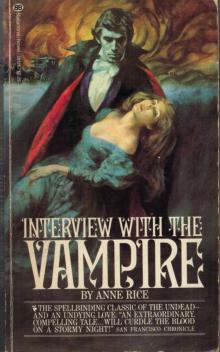 Interview with the Vampire
Interview with the Vampire Christ the Lord: Out of Egypt
Christ the Lord: Out of Egypt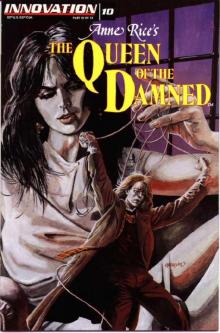 The Queen Of The Damned
The Queen Of The Damned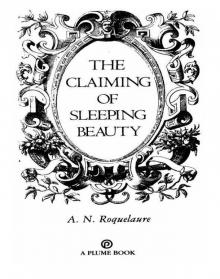 The Claiming of Sleeping Beauty
The Claiming of Sleeping Beauty Prince Lestat
Prince Lestat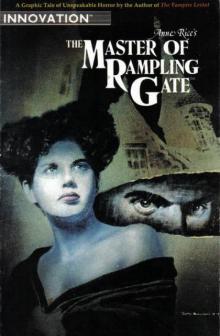 The Master of Rampling Gate
The Master of Rampling Gate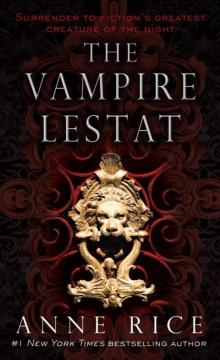 The Vampire Lestat
The Vampire Lestat Blood Canticle
Blood Canticle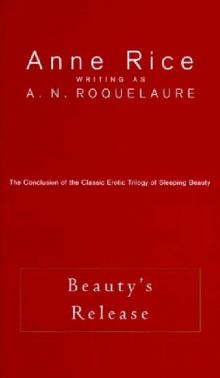 Beauty's Release
Beauty's Release Pandora
Pandora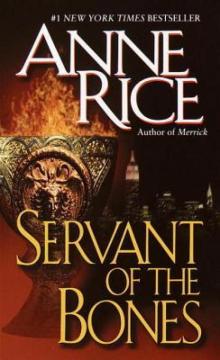 Servant of the Bones
Servant of the Bones Of Love and Evil
Of Love and Evil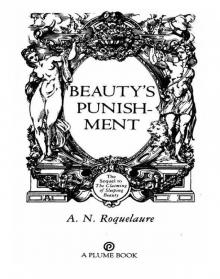 Beauty's Punishment
Beauty's Punishment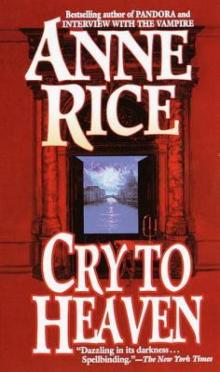 Cry to Heaven
Cry to Heaven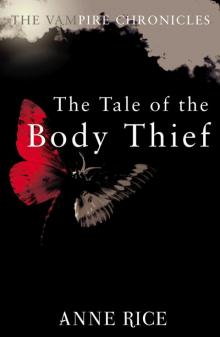 The Tale of the Body Thief
The Tale of the Body Thief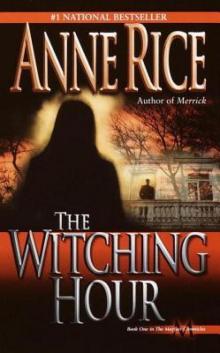 The Witching Hour
The Witching Hour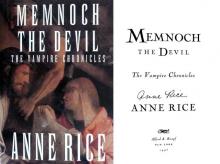 Memnoch the Devil
Memnoch the Devil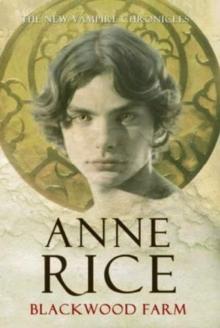 Blackwood Farm
Blackwood Farm Beauty's Kingdom
Beauty's Kingdom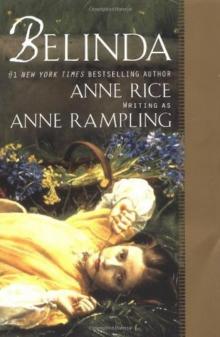 Belinda
Belinda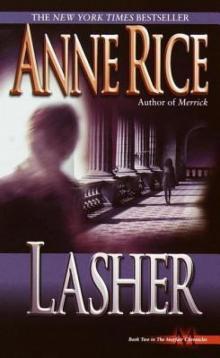 Lasher
Lasher Vittorio, the Vampire
Vittorio, the Vampire Angel Time
Angel Time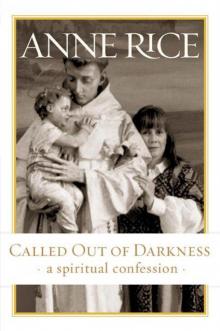 Called Out of Darkness: A Spiritual Confession
Called Out of Darkness: A Spiritual Confession Blood And Gold
Blood And Gold The Passion of Cleopatra
The Passion of Cleopatra Taltos
Taltos Exit to Eden
Exit to Eden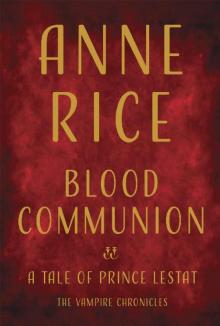 Blood Communion (The Vampire Chronicles #13)
Blood Communion (The Vampire Chronicles #13) The Wolf Gift
The Wolf Gift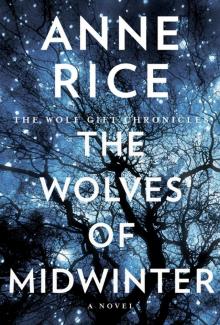 The Wolves of Midwinter
The Wolves of Midwinter Prince Lestat and the Realms of Atlantis
Prince Lestat and the Realms of Atlantis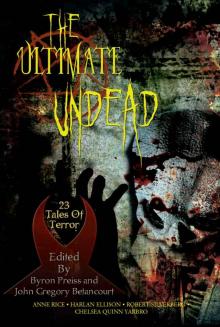 The Ultimate Undead
The Ultimate Undead The Vampire Lestat tvc-2
The Vampire Lestat tvc-2 The Road to Cana
The Road to Cana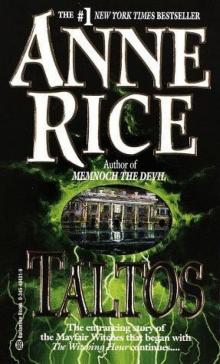 Taltos lotmw-3
Taltos lotmw-3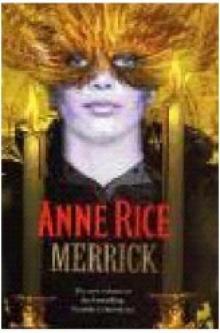 Merrick tvc-7
Merrick tvc-7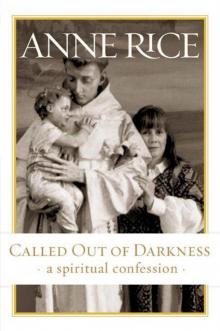 Called Out of Darkness
Called Out of Darkness Pandora - New Vampires 01
Pandora - New Vampires 01 Bllod and Gold
Bllod and Gold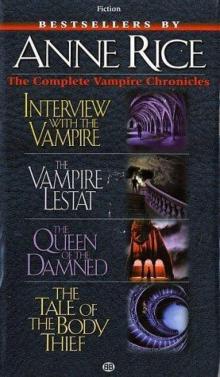 The Queen Of the Damned: Vampire Chronicles
The Queen Of the Damned: Vampire Chronicles The Sleeping Beauty Trilogy
The Sleeping Beauty Trilogy The Claiming of Sleeping Beauty b-1
The Claiming of Sleeping Beauty b-1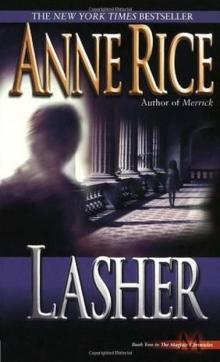 Lasher lotmw-2
Lasher lotmw-2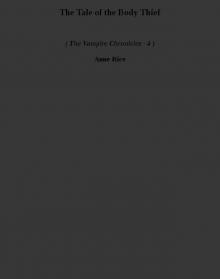 The Tale of the Body Thief tvc-4
The Tale of the Body Thief tvc-4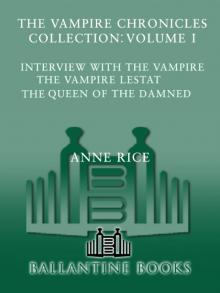 The Vampire Chronicles Collection
The Vampire Chronicles Collection Ramses the Damned
Ramses the Damned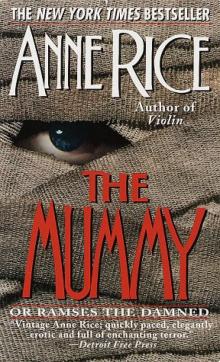 The Mummy - or Ramses the Damned
The Mummy - or Ramses the Damned Vittorio, The Vampire - New Vampires 02
Vittorio, The Vampire - New Vampires 02 The Vampire Armand tvc-6
The Vampire Armand tvc-6 Queen of the Damned tvc-3
Queen of the Damned tvc-3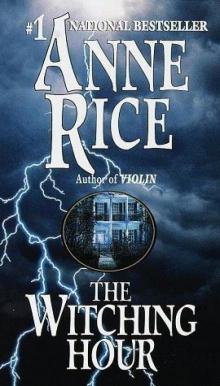 The witching hour lotmw-1
The witching hour lotmw-1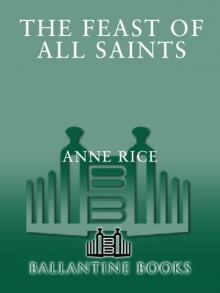 Feast of All Saints
Feast of All Saints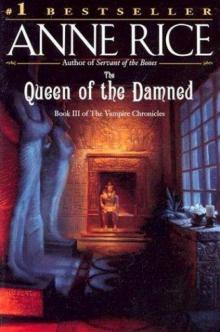 Queen of the Damned
Queen of the Damned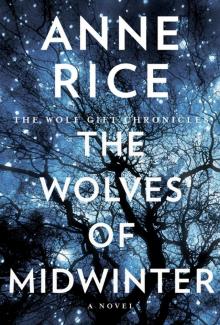 The Wolves of Midwinter twgc-2
The Wolves of Midwinter twgc-2 The Mummy
The Mummy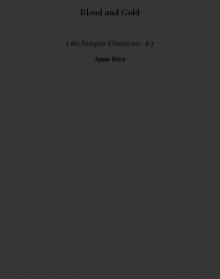 Blood and Gold tvc-8
Blood and Gold tvc-8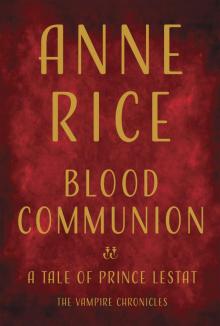 Blood Communion
Blood Communion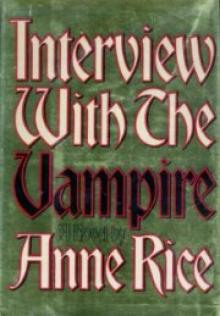 Interview with the Vampire tvc-1
Interview with the Vampire tvc-1 Prince Lestat: The Vampire Chronicles
Prince Lestat: The Vampire Chronicles